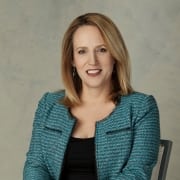
Booz Allen Hamilton Executive Vice President Kristine Martin Anderson is a Pinnacle Awards finalist in the Healthcare Executive of the Year category. Here, she shares what made her successful, how she helps shape next-gen GovCon leaders and the biggest career risk she’s taken and more.
What key achievements did you have in 2017?
Martin Anderson: 2017 was a very exciting year for Booz Allen’s Health team because it was a payoff year. Over the past few years, we’ve made quite a few investments in new service offerings and talent and achieved success in new spaces in 2017. For the third year in a row, we expanded an already very large federal health business by double digits. We’re now approaching $1 billion in annual revenue in federal health. That was a goal that I set six years ago and I am tickled to see this amazing team approach that milestone.
What has made you successful in your current role?
Martin Anderson: Without a doubt the most important job of a leader is to choose the right team and to make sure that the same mentality is shared across all leaders on the team. Booz Allen has a strong culture of collaboration and innovation. Our team embodies collective ingenuity — and we really enjoy solving hard problems with and on behalf of our clients.
How do you help shape the next-generation GovCon leaders?
Martin Anderson: I feel an acute responsibility to support other women in the government contracting space. We can’t see one another as competitors because we have to raise all boats. Booz Allen is unique in that we have 5 women (of 12) on our board of directors and six women (of 11) on our leadership team. We need to work to make female representation in leadership the norm across the industry.
Which rules do you think you should break more as a leader?
Martin Anderson: Rules are framed by authority and reinforced by hierarchy. I generally don’t like to use authority and believe we need as little hierarchy in business as possible and practical. I believe in empowerment — pushing the decision down to the person with the most complete information about that topic. Of course, you need to make sure that the decision-maker has context, is prepared to make a decision and understands any guardrails, but we are all better off with empowered teams. Leaders should resist the temptation to be seen as the one with all the answers.
What’s the biggest professional risk you’ve ever taken?
Martin Anderson: When I was 24, I joined two physician executives to form a software startup focused on health care quality measurement and improvement. I was too inexperienced to appreciate just how risky it was to try to develop software that would be delivered “as a service” in the mid-1990s, the earliest days of the internet.
I did not appreciate how hard it would be to convince hospitals that we could secure PHI or how often the rapid evolution of the browsers would break our software. We just got up every day and slogged through and we had great success amid many failures. I got the education of a lifetime through the growth, public offering and ultimate sale of that business. The confidence you gain from overcoming ignorance over and over again is priceless. The next time I took a big risk to work in federal contracting, where I had zero experience, I knew I’d figure it out.

